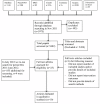Interventions to improve cultural competency in healthcare: a systematic review of reviews
- PMID: 24589335
- PMCID: PMC3946184
- DOI: 10.1186/1472-6963-14-99
Interventions to improve cultural competency in healthcare: a systematic review of reviews
Abstract
Background: Cultural competency is a recognized and popular approach to improving the provision of health care to racial/ethnic minority groups in the community with the aim of reducing racial/ethnic health disparities. The aim of this systematic review of reviews is to gather and synthesize existing reviews of studies in the field to form a comprehensive understanding of the current evidence base that can guide future interventions and research in the area.
Methods: A systematic review of review articles published between January 2000 and June 2012 was conducted. Electronic databases (including Medline, Cinahl and PsycINFO), reference lists of articles, and key websites were searched. Reviews of cultural competency in health settings only were included. Each review was critically appraised by two authors using a study appraisal tool and were given a quality assessment rating of weak, moderate or strong.
Results: Nineteen published reviews were identified. Reviews consisted of between 5 and 38 studies, included a variety of health care settings/contexts and a range of study types. There were three main categories of study outcomes: patient-related outcomes, provider-related outcomes, and health service access and utilization outcomes. The majority of reviews found moderate evidence of improvement in provider outcomes and health care access and utilization outcomes but weaker evidence for improvements in patient/client outcomes.
Conclusion: This review of reviews indicates that there is some evidence that interventions to improve cultural competency can improve patient/client health outcomes. However, a lack of methodological rigor is common amongst the studies included in reviews and many of the studies rely on self-report, which is subject to a range of biases, while objective evidence of intervention effectiveness was rare. Future research should measure both healthcare provider and patient/client health outcomes, consider organizational factors, and utilize more rigorous study designs.
Figures
References
-
- Cross TL, Bazron BJ, Dennis KW, Isaacs MR. Towards a culturally competent system of care. A monograph of effective services for minority children who are severely emotionally disturbed. Washington DC: CASSP Technical Assistance Centre, Georgetown University Child Development Center; 1989.
-
- Pearson A, Srivastava R, Craig D, Tucker D, Grinspun D, Bajnok I, Griffin P, Long L, Porritt K, Han T, Gi AA. Systematic review on embracing cultural diversity for developing and sustaining a healthy work environment in healthcare. Int J Evid Based Healthc. 2007;14:54–91. - PubMed
-
- Anderson LM, Scrimshaw SC, Fullilove MT, Fielding JE, Normand J. Culturally competent healthcare systems. A systematic review. American Journal of Preventative Medicine. 2003;14(3S):68–79. - PubMed
Publication types
MeSH terms
LinkOut - more resources
Full Text Sources
Other Literature Sources


